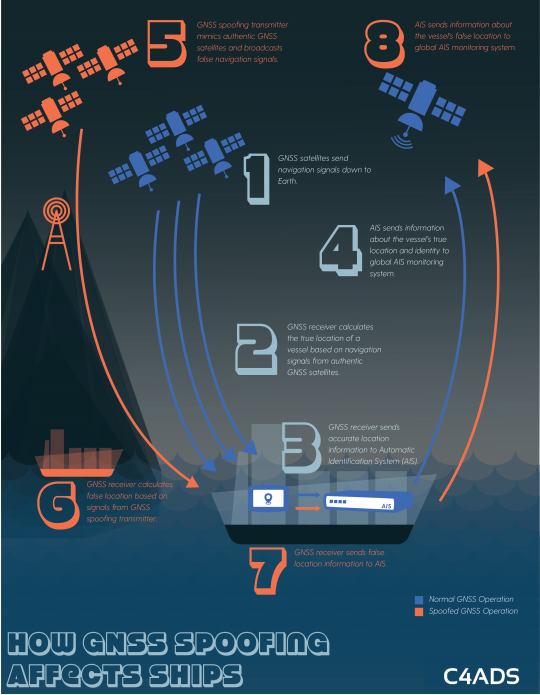C4ADS, a non-profit analytic group, launched a report according to which Russia is spoofing GPS signals. After a year of research ‘Above Us Only Stars – Exposing GPS spoofing in Russia and Syria’ report highlights that the Global Navigation Satellite Systems (GNSS) attacks are emerging as a disruptive and strategic threat.
In the report, the analytic group presents its findings from a year-long investigation ending in November 2018 on an emerging subset of EW activity: the ability to mimic, or ‘spoof,’ legitimate GNSS signals in order to manipulate PNT data.
The infographic below, presents and explains the steps taken on how GPS spoofing affects ships.

- GPS satellites send navigation signals to Earth;
- GNSS receiver calculates the true location of a vessel based on navigation signals from authentic GNSS satellites;
- GNSS receiver sends accurate location information to Automatic Identification System (AIS);
- AIS sends information about the vessel’s true location and identify to global AIS monitoring system;
- GNSS spoofing transmitter mimics authentic GNSS satellites and broadcasts false navigation signals;
- GNSS receiver calculates false location based on signals from GNSS spoofing transmitter;
- GNSS receiver sends false location information to AIS;
- AIS sends information about the vessel’s false location to global AIS monitoring system.
Moreover, by using publicly available data and commercial technologies, C4ADS detects and analyzes patterns of GNSS spoofing in the Russian Federation, Crimea, and Syria that demonstrate the Russian Federation is growing a comparative advantage in the targeted use and development of GNSS spoofing capabilities to achieve tactical and strategic objectives at home and abroad.
Significant opportunities exist for both public and private sector organizations to get ahead of the curve and address these challenges head-on.
Increased public awareness of GNSS interference threats can lead to not only a more measured and proportional response by private sector organizations, but also a more open discussion on how these threats can be successfully mitigated.
In light of the report, the Standard Club published precautions and considerations to its members:
- Ensure navigators have an awareness of GPS jamming and spoofing and the differences between the two and how and what ship’s equipment they will effect.
- Ensure navigators can use a range of position fixing methods in order to cross check the vessel’s position and accuracy of the GPS location being shown.
- Ensure navigators can use other means of fixing the vessel’s position without the use of GPS.
For more information on the PDF, you may click herebelow






























































